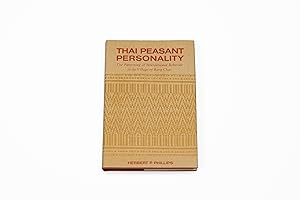Descripción
English text, Hardcover, 15.8 x 23.4 cm, 0.507 Kg; 231 pages with no illustrations.; Standard book number 520-01008-6.; Used with minor signs of wear on the dust jacket and interior. The dust jacket is now protected with a clearcover.; Readers interested in the psychology of non-western peoples will find this volume provocative in both descriptive and theoretical detail. The first book-length study of Siamese psychological life, it describes the members of an Asian peasant community whose dominant personality traits are aimed at the maintenance of their individuality, privacy, and sense of self-regard. In addition, it offers suggestions for handling many of the theoretical and technical problems crucial to cross-cultural personality research. Basing his research on two years of field work in the Central Plain community of Bang Chan, Mr.Phillips offers a systematic analysis and comparison of two kinds of data: observations of the villagers, overt behaviour in workaday social encounters, and their subjective responses to a special psychological test. Many readers will find particular value in his discussion of the design, translation, and implementation of psychological research methods in non-Western cultures. The author analyses the central role of affability and play in the villager's daily contacts, the use of politeness as a "social cosmetic" and the implications of this cosmetic for the inner lives of the Thai. He examines the villager's readiness to become involved with others in the first place, and the sense of linkage that ties them together over time. He demonstrates how the individualistic tendencies of the Thai intrude of interpersonal relationships and how in the village of Bang Chan all social interaction is set within framework of cosmic unpredictability, with human volition only one of several indeterminate and uncontrollable factors in life. This "loosely structured" system of social relationships is seen to have its roots in early childhood, with strong support from both Hinayana Buddhist doctrine and the sociologically simple and undifferentiated nature of Bang Chan society. In presenting the psychological test results, the author examines the villager's attitudes toward authority, dependency, and aggression, their anxieties and reactions to crises, and their dominant drives and wishes. These various issues are linked to the theoretical problem of "conformity" and to the basic human need for privacy and psychological isolation. N° de ref. del artículo 791B
Contactar al vendedor
Denunciar este artículo
![]()

